

Economist: Job description. Economist: job description. Economists use economic concepts, theories and analytical techniques to provide advice and practical information that will aid managerial planning and decision-making tasks.
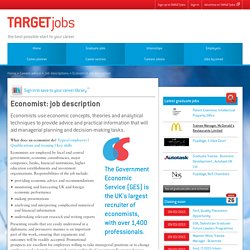
What does an economist do? Typical employers | Qualifications and training | Key skills Economists are employed by local and central government, economic consultancies, major companies, banks, financial institutions, higher education establishments and investment organisations. Economist Job Information. Page Content Economist Hours37 per weekStarting salary£25,000 + per year If you are interested in the business world, and are good at researching and number work, this job could be ideal for you.
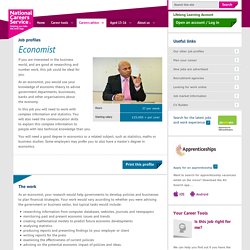
As an economist, you would use your knowledge of economic theory to advise government departments, businesses, banks and other organisations about the economy. Economist.pdf. Economics Careers. Economists provide specialist advice to organisations in the public, finance, manufacturing political and other sectors.
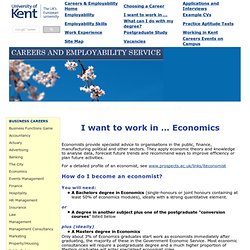
They apply economic theory and knowledge to analyse data, forecast future trends and recommend ways to improve efficiency or plan future activities. For a detailed profile of an economist, see www.prospects.ac.uk/links/iteconomist. Government economists. What do Government Economists do?
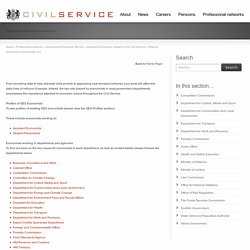
Home » Professional networks » Government Economic Service » Assistant economists careers in the Civil Service » What do Government Economists do? Back to Home Page From providing data to help alleviate child poverty to appraising new transport schemes your work will affect the daily lives of millions of people. Indeed, the key role played by economists in most government departments emphasises the importance attached to economic advice throughout the Civil Service. Economic Assessment Centre Topics and SAQs - Civil Service. Back to Homepage Candidates will be asked to write a report explaining what an economic evaluation is and what they think this evaluation should take into account.
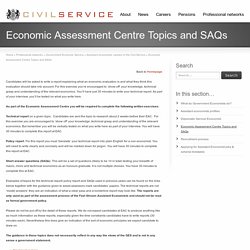
For this exercise you’re encouraged to ‘show-off’ your knowledge, technical grasp and understanding of the relevant economics. You’ll have just 30 minutes to write your technical report. As part of your interview, you’ll be tested on what you write here. As part of the Economic Assessment Centre you will be required to complete the following written exercises: Technical report on a given topic. Policy report. Short answer questions (SAQs). Examples of topics for the technical report/ policy report and SAQs used in previous years can be found on the links below together with the guidance given to assist assessors mark candidates’ papers.
Please do not be put off by the detail of these reports. Applying for Assistant Economist jobs & scheme timetable - Civil Service. Back to Homepage All applications must be made online via the Fast Stream website, via the Analytical Fast Stream.
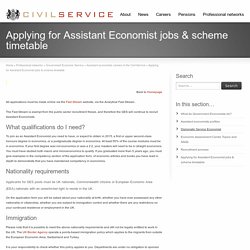
The Fast Stream is exempt from the public sector recruitment freeze, and therefore the GES will continue to recruit Assistant Economists. What qualifications do I need? To join as an Assistant Economist you need to have, or expect to obtain in 2015, a first or upper second-class honours degree in economics, or a postgraduate degree in economics. At least 50% of the course modules must be in economics. Nationality requirements Applicants for GES posts must be UK nationals, Commonwealth citizens or European Economic Area (EEA) nationals with an unrestricted right to reside in the UK.
On the application form you will be asked about your nationality at birth, whether you have ever possessed any other nationality or citizenship, whether you are subject to immigration control and whether there are any restrictions on your continued residence or employment in the UK. Immigration. Case studies: Research fellow in health economics: Patrick. Patrick's graduate and postgraduate studies were essential in securing his post as a research fellow in a health economic research centre...
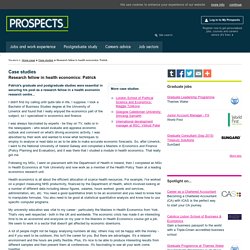
I didn't find my calling until quite late in life, I suppose. I took a Bachelor of Business Studies degree at the University of Limerick and found that I really enjoyed the economics part of the subject, so I specialised in economics and finance. I was always fascinated by experts - be they on TV, radio or in the newspapers - who would evaluate and appraise economic outlook and comment on what's driving economic activity. Health Economics and Outcomes Research Manager - ABPI Careers. So, what do you do?
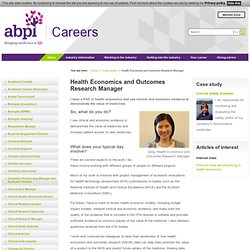
I use clinical and economic evidence to demonstrate the value of medicines and increase patient access to new medicines. What does your typical day involve? There are several aspects to the work I do; these involve working with different groups of people on different projects. Much of my work is involved with project management of economic evaluations for health technology assessment (HTA) submissions to bodies such as the National Institute of Health and Clinical Excellence (NICE) and the Scottish Medicine Consortium (SMC). For these I have to build or review health economic models, including budget impact models, interpret clinical and economic evidence, and make sure the quality of the evidence that is included in the HTA dossier is suitable and provides sufficient evidence to convince payers of the value of the medicine.
A day in the life of health outcomes. Working in Health Outcomes and Health Economics can be a challenging position.

Here is an interview that CK Clinical conducted with one Health Outcomes expert working within the pharmaceutical industry. Working in Health Economics. Author: Ian Murnaghan BSc (hons), MSc - Updated: 28 December 2012| Comment Health economics is one of those rapidly growing fields that links up business with health care.
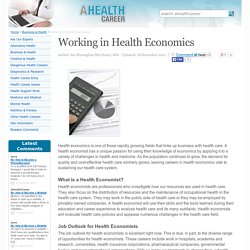
Hays - Recruiting Experts Worldwide. Building a Roadmap for Health Outcomes Liaison Career Advancement. With payers continually tightening healthcare budgets in the U.S., Europe and globally, a new position is gaining prominence in the pharmaceutical and biotechnology industries — health outcomes liaisons (HOLs). HOLs are field-based teams charged with calling on payers to discuss the health economics potential of a company’s brands.
While still a relatively new function at most companies, there are a handful of these teams already maturing and needing to differentiate between new hires and experienced HOLs. Unfortunately, most companies do not yet know where to start in plotting health outcomes liaison career advancement. “There’s a brick wall as far as advancement,” explained an interviewed executive from a top pharma company. This brick wall is true for the outcomes liaisons as well as the HOL managers themselves. For other companies looking for a place to start, CEI analysts identified the following five potential career tracks: Management track. O2 CareersHealthResEconComm Luigi Siciliani presentation. O2 CareersHealthResEconCommJing Shen presentation. O2 CareersHealthResEconComm Karen Coulton presentation.
Economist Group. HM Treasury - HM Treasury. Improving health and care: the role of the outcomes frameworks. Institute For Fiscal Studies - IFS. Homepage. IPPR - Institute for Public Policy Research. International Monetary Fund Home Page. National Institute of Economic and Social Research. The Society of Business Economists is the leading organisation serving business economists in the UK. Behavioural economics and public policy. Experimental feature The past decade has been a triumph for behavioural economics, the fashionable cross-breed of psychology and economics. First there was the award in 2002 of the Nobel Memorial Prize in economics to a psychologist, Daniel Kahneman – the man who did as much as anything to create the field of behavioural economics.
Bestselling books were launched, most notably by Kahneman himself (Thinking, Fast and Slow, 2011) and by his friend Richard Thaler, co-author of Nudge (2008). Behavioural economics seems far sexier than the ordinary sort, too: when last year’s Nobel was shared three ways, it was the behavioural economist Robert Shiller who grabbed all the headlines. Behavioural economics is one of the hottest ideas in public policy. Yet, as with any success story, the backlash has begun. A recent experiment designed by BIT highlights both the opportunity and the limitations of the new discipline. Three points should be made here. Why bother with the maths? Behavioural Economics MSc Course.